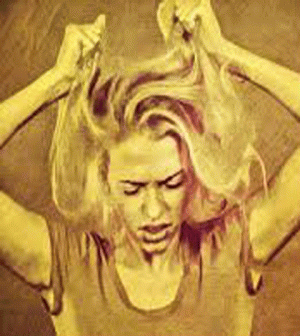- Finding Unshakable Power in a World That Wants to Pull Us ApartPosted 5 months ago
- What could a Donald Trump presidency mean for abortion rights?Posted 5 months ago
- Financial Empowerment: The Game-Changer for Women in Relationships and BeyondPosted 6 months ago
- Mental Health and Wellbeing Tips During and After PregnancyPosted 6 months ago
- Fall Renewal: Step outside your Comfort Zone & Experience Vibrant ChangePosted 7 months ago
- Women Entrepreneurs Need Support SystemsPosted 7 months ago
Nail Biting, Skin Picking, Hair Pulling: More Than Just Bad Habits

By Dr. Sanam Hafeez PsyD, Neuropsychologist
Sometimes it can be hard to explain why we do the things we do. It is common to experience stress, anxiety or frustration in our lifetime, but what we do to cope with these things matters the most. There are times where you may catch yourself biting your nails, picking at your skin, or even avoiding physical interactions due to germs. But how far is too far? Dr. Sanam Hafeez, a NYC based neuropsychologist and Teaching Faculty Member at Columbia University Teacher’s College, gives insight on behaviors that are more dire than merely bad habits.
Onychophagia (Nail Biting)
Nail biting is an oral compulsive habit and that can develop from stress, nervousness, or excitement. A study published this year in Scientific American puts nail biting in another realm of behavior: body-focused repetitive disorders, like scratching or patting your own hair. And it seems to tie into one particular personality type that has a higher potential for boredom, stress, and anxiety than many others: perfectionists. Excessive nail biting can lead to infections, inflammation, and even tooth problems. The usual method for beating this habit? Dr. Hafeez says, “Override your old habit with a new one by “tricking” your brain using rewards, awareness exercises, and other methods. A typical strategy is to get subjects to note whenever they feel the urge to bite their nails, a feeling called a “cue,” and reward them with something else whenever they feel it, like stroking one’s hands.”
Germaphobia
President Trump is an admitted germaphobic and has confessed that he dreads shaking hands. Germaphobia, also known as Mysophobi , is a fear of contamination and germs. This is a form of obsessive compulsive disorder. You may feel the need for excessive washing and cleaning, constantly focusing on a way to sanitize everything you come in contact with. Germaphobia can lead to irritated skin and discomfort over time. Dr. Sanam Hafeez suggests medication that moderates serotonin in the brain known as SSRIs or Cognitive Behavior Therapy.
Excoriation (Skin Picking)
Skin picking is a repetitive “Self-grooming” behavior. This disorder can develop in two ways, through stress and after some kind of rash or minor injury. Skin picking can lead to tissue damage, infection, and even scarring. Dr. Sanam Hafeez suggests exercising as a way to distract yourself and improve your mood. “Taking care of any scars you have already with essential oils will also lessen the urge.”
Trichomania (Hair Pulling)
Trichotillomania is a disorder that urges individuals to pull out body hair. This is usually triggered by anxiety and can provide a feeling of temporary satisfaction. “The exact cause of trichotillomania isn’t known. It may be related to abnormalities in brain pathways that link areas involved in emotional regulation, movement, habit formation, and impulse control,” says Dr. Hafeez. Excessive hair pulling from the scalp, eyebrows, and eyelashes can lead to patches and bald spots. ”Distract yourself with sensory toys which allow your body to focus on other things.” Adding petroleum jelly to problem areas will allow you to be less likely to put the hair because it is slippery,” says Dr. Hafeez. The main treatment for trichotillomania is a type of behavior therapy called habit reversal training. Basically, this means replacing a bad habit with something else that’s not harmful.
********
 Dr. Sanam Hafeez PsyD is a NYC based licensed clinical psychologist, teaching faculty member at the prestigious Columbia University Teacher’s College and the founder and Clinical Director of Comprehensive Consultation Psychological Services, P.C. a neuropsychological, developmental and educational center in Manhattan and Queens.
Dr. Sanam Hafeez PsyD is a NYC based licensed clinical psychologist, teaching faculty member at the prestigious Columbia University Teacher’s College and the founder and Clinical Director of Comprehensive Consultation Psychological Services, P.C. a neuropsychological, developmental and educational center in Manhattan and Queens.
Dr. Hafeez masterfully applies her years of experience connecting psychological implications to address some of today’s common issues such as body image, social media addiction, relationships, workplace stress, parenting and psychopathology (bipolar, schizophrenia, depression, anxiety, etc…). In addition, Dr. Hafeez works with individuals who suffer from post traumatic stress disorder (PTSD), learning disabilities, attention and memory problems, and abuse. Dr. Hafeez often shares her credible expertise to various news outlets in New York City and frequently appears on CNN and Dr.Oz.
In addition, Dr. Hafeez serves as a medical expert for various news outlets and programs, and as an expert witness providing full evaluations and witness testimony to law firms and courts. Connect with her via twitter @comprehendMind or at www.comprehendthemind.com.






